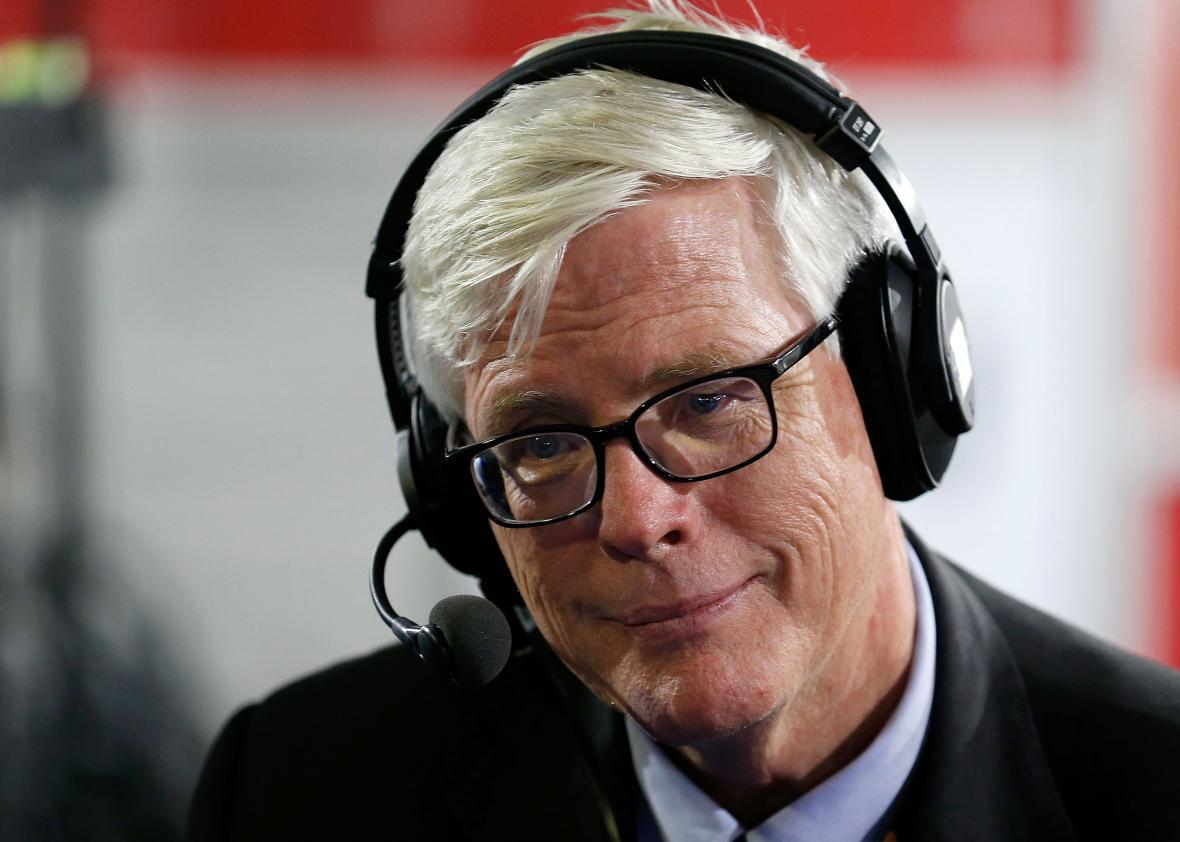Conservative radio host and aspiring writer Hugh Hewitt’s endorsement of Donald Trump is, in one sense, a surprise. In another sense, it is an incoherent word salad. First, the surprise part: Hewitt aggressively questioned Trump on his show last September, eliciting embarrassing confusion from the candidate about the difference between Iran’s Quds force (a unit of the Revolutionary Guard) and the region’s Kurds (an ethnic group). This was back in those early, innocent days when such a gaffe would actually qualify as one of the 10 or so most inane things Trump said in a given week. CNN, in its infinite wisdom, even asked Hewitt to be a co-moderator for several debates, and Hewitt was relatively assertive in his questioning of Trump in front of a live national television audience. Trump, naturally, attacked Hewitt personally. So, yes, an apparent endorsement now is strange.
I say apparent because Hewitt’s explanation of that endorsement is written like a fourth-grade essay hastily translated from Portuguese. Hewitt, who styles himself as a quasi-intellectual but is a Republican partisan at heart, published an op-ed in the Washington Examiner on Sunday that makes three arguments for why reluctant conservatives should support Trump. The first is that a Hillary Clinton presidency would mean a liberal Supreme Court. Hewitt explains it this way: “I have the advantage of having taught Con Law for 20 years, of having argued before very liberal appellate judges like Judge Stephen Reinhardt of the very liberal Ninth Circuit, of practicing with the best litigators in the land, and I know what a very liberal SCOTUS means: conservatism is done.”
Hewitt’s second argument is that Clinton is a Putin “pawn.” This may seem counterintuitive, considering that her opponent has spoken warmly of Putin, and has advocated policies that Putin agrees with. But Hewitt argues that Clinton’s emails are certainly in Russian hands, which means she will be forced to do their bidding. (Of the Russians, he writes, “They are a GEICO ad of spying: That’s what they do.”)
Hewitt’s third argument is more confusing, and even more poorly phrased. Here it is:
The first two arguments are negatives. But there is a positive case for Donald Trump, a third prong in the case for working for Trump’s election: He brings 3,000 political appointees with him, and the first two—Indiana Gov. Mike Pence as VP and New Jersey Gov. Chris Christie has chief of the transition—telegraph that the vast majority of his team in the executive branch (and his appointees on the courts) will be conservatives.
Yes, Trump is transplanting economic populism into the GOP, and parts of the conservative movement are struggling to reject the transplant (just as parts of the Democratic Party are denying that the principle of transference works when applied to their passion for/love of Bernie Sanders/President Obama and HRC.)
The second part here is essentially gibberish, but I think we can all sense what Hewitt is getting at. Or maybe we can’t: Upon re-reading the passage, I am less certain of what on Earth he is talking about. This is even truer of the ensuing paragraph, which also should be read in full:
But Donald Trump, like it or not—like him or not—is the imperfect messenger of the perfect storm in American politics. He is the shuddering, convulsive conclusion to decades of perceived indifference to the American middle class combined with a conviction that the GOP is spineless, and if he is not to your tastes, too bad.
In short, Hewitt could have been one of the conservatives who preserved their dignity and pride by refusing to endorse Trump. Predictably, he has not chosen that route. Less predictably, he has chosen a barely legible way to express his preferred option. It’s hard not to pity a guy who can actually write the following sentence and allow it to be published: “And he backed away from the cliff of indifference to race of such massive proportions—the Judge Curiel episode which had me launching whatever rhetorical broadside I could muster against him—that it would have obliged me to surrender the election and the courts.” It’s almost enough to make one pine for the much terser and more cogent Twitter musings of Hewitt’s man, Donald Trump.
